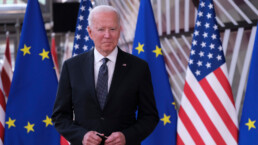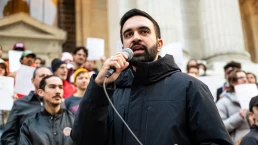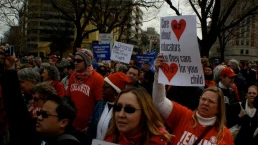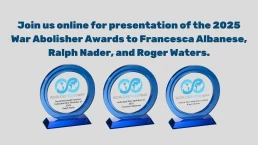“There is no progress happening with respect to the Iran deal now,” a White House official confirmed. “We don’t anticipate any progress anytime in the near future. That’s just not our focus.”
by Jessica Corbett, Common Dreams
U.S. President Joe Biden said in a November exchange caught on camera and now circulating on social media that the Iran nuclear deal “is dead.”
Damon Maghsoudi, who published the video on Twitter, told The Hill that it was filmed by Sudi Farokhnia, acting president of Iranian-American Democrats of California, on the sidelines of a November 4 campaign event in the state.
Referring to the Joint Comprehensive Plan of Action (JCPOA) negotiated in 2015 under then-President Barack Obama and then ditched three years later by former President Donald Trump, Farokhnia asked Biden—who campaigned on reviving the deal and whose administration has engaged in talks to do so—if he would announce that it is dead.

Biden responded no, and when the Orange County activist asked why not, he said: “A lot of reasons. It is dead, but we’re not gonna announce it.”
After Farokhnia explained that “we just don’t want any deals with the mullahs… they don’t represent us,” the president said that “I know they don’t represent you, but they’ll have a nuclear weapon that they’ll represent.”
Addressing questions about the video on Tuesday, John Kirby, Biden’s National Security Council coordinator for strategic communications, did not use the president’s previous language but confirmed that the JCPOA is not currently a priority, citing Iranian authorities’ brutal crackdown on mass protests since September and the government sending unmanned aerial vehicles (UAVs), or drones, to Russia as it wages war on Ukraine.
“The Joint Comprehensive Plan of Action is just not our focus right now. And it’s not on our agenda. We simply don’t see a deal coming together anytime soon while Iran continues to kill its own citizens and selling UAVs to Russia,” Kirby told reporters Tuesday. “There is no progress happening with respect to the Iran deal now. We don’t anticipate any progress anytime in the near future. That’s just not our focus.”
Ryan Costello of the National Iranian American Council (NIAC) noted in a series of tweets Tuesday that Trita Parsi of the Quincy Institute for Responsible Statecraft “predicted a year ago that the deal was headed toward a coma option—too risky to declare dead, too costly to revive. And that is where the agreement has been since at least the summer.”
“As for the ‘complicated’ reasons Biden would not want to formally announce the deal’s demise, one is the protests,” Costello continued. “With the deal in a coma, the U.S. has been able to rally the international community to press Iran for its abuses, including two unprecedented steps at the U.N.”
Separately, in a statement from NIAC on Tuesday, Costello commended the Biden administration “for taking action to clarify and broaden its sanctions exemptions across all sanctioned countries, including Iran.”
Before the video began circulating online, Reuters reported Monday that a senior Biden administration official who spoke on condition of anonymity said that while progress on the nuclear deal is stalled, Enrique Mora, the European diplomat who coordinates negotiations, “keeps talking to all sides.”
“Whether, when, and how the JCPOA can be revived is a difficult question,” the Biden official added. “But even if, at some point, the JCPOA were to die, that would not mean that diplomacy would be buried at the same time.”
The news agency noted the European Union’s foreign policy chief, Josep Borrell, said last week that “I think that we do not have a better option than the JCPOA to ensure that Iran does not develop nuclear weapons,” and “we have to continue engaging as much as possible in trying to revive this deal.”
Borrell said in a tweet Tuesday that during a “necessary meeting” with Iranian Foreign Minister Hossein Amirabdollahian in Jordan “amidst deteriorating Iran-E.U. relations,” he stressed the “need to immediately stop military support to Russia and internal repression in Iran,” but also agreed that “we must keep communication open and restore JCPOA” based on the negotiations held in Vienna since last year.
According to Reuters, “In separate comments at the conference in Jordan, Amirabdollahian said Iran would back the revival of the deal as long as its red lines were respected, asking other parties to the deal to be “realistic.”
Meanwhile, United Nations Under-Secretary-General for Political and Peacebuilding Affairs Rosemary DiCarlo on Monday told the U.N. Security Council—of which the U.S. is one of five permanent members—that the International Atomic Energy Agency “has reported on the intention of Iran to install new centrifuges at the Natanz Fuel Enrichment Plant and to produce more uranium enriched up to 60% at the Fordow Fuel Enrichment Plant.”
“We once again call on Iran to reverse the steps it has taken since July 2019 that are not consistent with its nuclear-related commitments under the plan,” DiCarlo said. “We also call on the United States to lift or waive its sanctions as outlined in the plan, and to extend the waivers regarding the trade in oil with Iran.”
“Restoring the JCPOA remains crucial: to assure the international community of the peaceful nature of Iran’s nuclear program and to allow Iran to reach its full economic potential,” she stressed. “We encourage all parties and the United States to resume their efforts to resolve the outstanding issues lest the gains achieved by the plan after years of painstaking efforts be completely lost.”
Recent Posts
Politicians Are Betraying Gen Z On Climate
July 10, 2025
Take Action Now While Gen-Zers thrift, knit, crochet, and find other ways to reduce our footprints, Trump and the GOP are greenlighting more climate…
Trump’s Deportation Threat Against Zohran Mamdani Is Shameful
July 10, 2025
Take Action Now In only half a year of Donald Trump’s presidency, he and his allies have turned deportation into an explicitly political threat…
Teachers Union Votes To Cut Ties To The Anti-Defamation League
July 10, 2025
Take Action Now In a momentous vote, the National Education Association voted to cut all ties with the Anti-Defamation League. The reason? “Despite…
2025 War Abolisher Awards Go To Albanese, Nader, Waters
July 9, 2025
Take Action Now The purpose of the awards is to honor and encourage support for those working to abolish the institution of war itself.By World…




